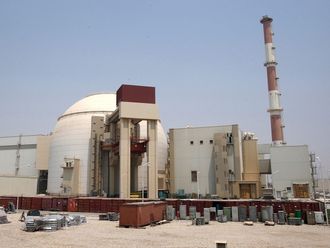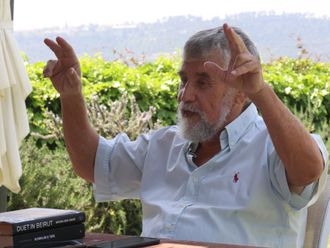Beirut: The pro-Syrian Arab Tawhid Party, a predominantly Druze community group, staged a parade in the village of Jahilieh in the Chouf district of Mount Lebanon last Sunday. This unprecedented show of force, presented in a pure display of military might rekindled old wounds associated with the 1975-1990 civil war when numerous militias were in business.
The move by the 10-year-old party flaunted dozens of masked-men, most of them wearing black-coloured clothes that intimidated many, intended to introduce members forming the “Tawhid Brigades”. Unlike the recent Hezbollah military parade in Qusayr (Syria), the Tawhid parade was clear of weapons, even if men were seen descending off high buildings using a doubled rope coiled around the body, which also showed off their physical capabilities.
Arab Tawhid Party leader Wiam Wahhab, a rival of both the Progressive Socialist Party (PSP) chief Walid Jumblatt and the Druze Lebanese Democratic Party head Talal Arslan, delivered a passionate speech at the Sunday gathering when he stated that his brigade was not a “military” outfit but one aimed for “change for a better tomorrow” though this sounded relatively vague.
“We reject using arms, except in instances of self-defense, and to help the Lebanese Army and to confront any Israeli aggression,” Wahhab told his supporters, which mimicked Hezbollah as the latter advanced claims that it too was helping the army.
The loquacious Wahhab is a frequent guest on all local television news shows who often engages in highly controversial discourses, though his Druze political group, also known as the Lebanese Unification Movement, is part of the March 8 coalition led by Hezbollah. Wahhab considered himself to be part of the pro-Syria March 8 alliance and seldom voiced a critical opinion of Hezbollah.
It was unclear whether Wahhab’s call on Druze leaders to unite “under the flag of their elders” and not under any other affiliation was a message to Hezbollah, or whether the parade was a Syrian-motivated response to the Hezbollah Qusayr military parade. Alternatively, Hezbollah may have encouraged this latest formation to eliminate the “sole remaining militia” label from itself, although a Druze Lebanese from the Hamadeh family, who did not wish his first name used, voiced his displeasure, arguing that militias make “us second class citizens”.
Ali Bashir, a Shiite Lebanese who claimed he was opposed to Hezbollah, lamented that such displays rekindled the lamentable atmosphere of the 1970s, which led to war. “We need to stop our tribal behaviour,” Bashir hammered, “if we are to become a nation.”
After the 1990 Taif Accords, all militias were abolished in Lebanon — with the exception of Hezbollah — and the Lebanese Forces leader Samir Geagea was imprisoned for eleven for his crimes. Most Lebanese believe that the era of militias ended, with many insisting that Hezbollah must surrender its weapons to the army.
A weak state with an even weaker military that allows foreign parties to manipulate Lebanese citizens is what the newly elected head-of-state vowed to rectify, though it was unclear if the significantly beefed up security forces would now tolerate the propagation of militias once again. What is new this time around is the notion that militias will now support the government and army, even if no one asked for such assistance, and the army hierarchy kept silent.












